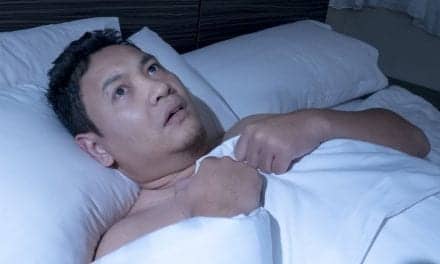Sleep onset, sleep maintenance, and terminal insomnia each have a different relationship to mood disorders.
Interview by Sree Roy
Grouping different symptoms into one diagnosis sometimes muddies the waters, says Courtney Bolstad, MS, a clinical psychology graduate student at the University of Mississippi. That’s why Bolstad teased apart three types of insomnias—sleep onset, sleep maintenance, and terminal (also known as early awakening)—in a study seeking to understand the relation between insomnia and affective disorders.
“Our study found that types of insomnia relate differently to anxiety and depressive symptoms in late life,” Bolstad says. “This suggests that the mechanisms that underlie the relation between insomnia and these symptoms of psychopathology may be different.
“With sleep onset issues it seems that it is anxiety that is likely making it difficult to fall asleep, whereas with depression we know there is less slow wave sleep and more REM sleep, which may be why individuals are waking more in the middle of the night. Understanding these mechanisms helps with designing treatments that can more effectively alleviate symptoms of depression, anxiety, and cooccurring insomnia.”
[Editor’s Note: Read the full study, What types of insomnia relate to anxiety and depressive symptoms in late life?, in the journal Heliyon.]
Bolstad discussed the study with Sleep Review over email. The transcript has been lightly edited for clarity and style.
Sleep Review (SR): What inspired you to investigate whether the type of insomnia would relate to anxiety or depression in older adults?
Bolstad: When considering the three types of insomnia (onset, maintenance, and terminal) in older adulthood, I wondered if older adults would not report terminal insomnia as a problem because older adults commonly wake earlier than individuals of younger ages. If older adults did not find terminal insomnia to be a problem or saw it as normative, I hypothesized terminal insomnia would not relate to affective symptoms in late life.
After digging into the literature on each type of insomnia, I was intrigued to learn onset insomnia commonly related to anxiety symptoms whereas maintenance insomnia commonly related to depressive symptoms, though I did not find many studies on older adults. This spurred me to study how each type of insomnia may relate to anxiety and depressive symptoms in late life.

SR: How did you determine each participant’s type of insomnia?
Bolstad: We used the first three questions of the Insomnia Severity Index to assess the degree participants experienced each type of insomnia. This scale is widely used in sleep research and practice, and it has been validated for use with older adults.
[RELATED: Digital Cognitive Behavioral Therapy for Insomnia Comparison Guide]
SR: What surprised you?
Bolstad: The biggest surprise to me was the size of the effects we found. We found medium to large effects for the relations between onset insomnia and anxiety symptoms as well as maintenance insomnia and depressive symptoms.
SR: Thoughts on whether sleep-onset insomnia is a gateway to sleep maintenance insomnia?
Bolstad: The present study was unable to test this question, though it is interesting. We conducted a follow-up analysis using a longitudinal data set, and we found a significant pathway from onset insomnia to maintenance insomnia one year later in older adults. Vivek Pillai, PhD, and colleagues (2015) also suggested that sleep onset insomnia may lead to more chronic insomnia.1
SR: What are the clinical implications of your research?
Bolstad: Basic clinical implications of this research include the need for thorough and precise assessment of insomnia and affective disorder symptoms in older adults. For example, if an older adult patient reports symptoms of anxiety or depression, the practitioner would be wise to also assess for onset and maintenance insomnia, or vice versa.
SR: What further research should be done?
Bolstad: Our findings support the need for further clinical intervention research on older adults to determine whether assessment and intervention on specific types of insomnia result in better mental health outcomes. Further, longitudinal research exploring the causality of the relations we found would help to advance the field.
The Study:
Bolstada CJ, Nadorffa MR. What types of insomnia relate to anxiety and depressive symptoms in late life? Heliyon. 2020 Nov 2;6(11):e05315.
Reference:
- Pillai V, Roth T, Drake CL. The nature of stable insomnia phenotypes. Sleep. 2015;38(1):127–38.
Photo 132352225 © Motortion – Dreamstime.com



